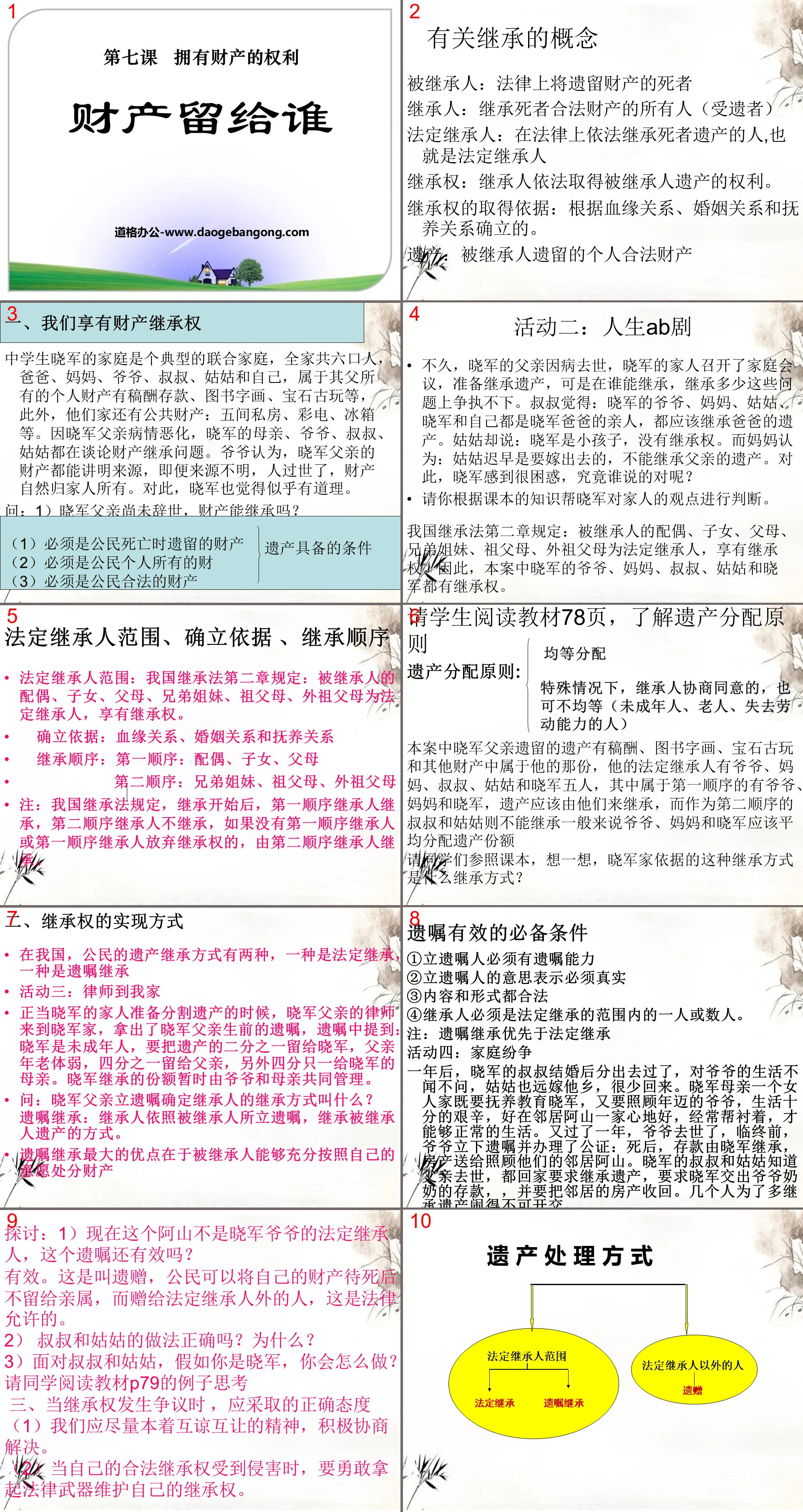People's Education Press Edition Eighth Grade Ideology and Morality Volume 2
Complete Book of Ideological and Moral Issues for Ninth Grade People's Education Press
People's Education Press Edition Seventh Grade Ideology and Morality Volume 1
People's Education Press Edition Seventh Grade Ideology and Morality Volume 2
People's Education Press Edition Eighth Grade Ideology and Morality Volume 1

| Category | Format | Size |
|---|---|---|
| People's Education Press Edition Eighth Grade Ideology and Morality Volume 2 | pptx | 6 MB |
Description
"Who should leave the property to?" The right to own property PPT courseware 5
The concept of inheritance
Deceased: A deceased person who legally leaves property
Heir: The owner (legend) who inherits the legal property of the deceased
Legal heir: The person who legally inherits the deceased's estate, that is, the legal heir.
Inheritance rights: The rights of heirs to obtain the inheritance of the deceased in accordance with the law.
The basis for obtaining inheritance rights: established based on blood relationship, marriage relationship and custody relationship.
Inheritance: the personal legal property left by the deceased
1. We enjoy the right to inherit property
The family of middle school student Xiaojun is a typical joint family. There are six members in the family, including father, mother, grandfather, uncle, aunt and himself. His father’s personal property includes royalties, books, calligraphy and paintings, gems and antiques, etc. In addition, they The home also has public properties: five private rooms, color TVs, refrigerators, etc. As Xiaojun's father's condition worsened, Xiaojun's mother, grandfather, uncle, and aunt were all discussing the issue of property inheritance. Grandpa believes that the origin of Xiaojun’s father’s property can be explained. Even if the origin is unknown, the property will naturally belong to the family after the person passes away. In this regard, Xiaojun also felt that it seemed reasonable.
Question: 1) Xiaojun’s father has not passed away yet, can he inherit his property?
2) Can all property be inherited?
3) What is inheritance?
(1) It must be the property left behind when the citizen dies
(2) It must be the property owned by an individual citizen
(3) It must be the legal property of citizens
Scope of legal heirs, basis for establishment, order of succession
Scope of legal heirs: Chapter 2 of my country’s Succession Law stipulates that the spouse, children, parents, brothers, sisters, grandparents, and maternal grandparents of the deceased are the legal heirs and enjoy the right to inheritance.
Basis for establishment: blood relationship, marriage relationship and custody relationship
Order of inheritance: first order: spouse, children, parents
Second order: brothers, sisters, grandparents, maternal grandparents
Note: my country's inheritance law stipulates that after the inheritance begins, the first-order heirs inherit, and the second-order heirs do not inherit. If there is no first-order heir or the first-order heir gives up the right to inherit, the second-order heir inherits.
2. How to realize inheritance rights
In our country, there are two ways of inheritance for citizens, one is statutory inheritance and the other is testamentary inheritance.
Activity 3: Lawyer comes to my home
Just when Xiaojun's family was preparing to divide the inheritance, Xiaojun's father's lawyer came to Xiaojun's house and took out Xiaojun's father's will. The will mentioned: Xiaojun is a minor and he wants to divide the inheritance into two parts. One was left to Xiaojun, whose father was old and frail, one quarter was left to his father, and only one of the other four was given to Xiaojun's mother. Xiaojun's inherited share is temporarily managed jointly by his grandfather and mother.
Question: What is the inheritance method in which Xiaojun’s father made a will to determine the heir? Testamentary inheritance: The way in which the heir inherits the estate of the deceased in accordance with the will made by the deceased.
The biggest advantage of testamentary inheritance is that the deceased can fully dispose of the property according to his own wishes.
Necessary conditions for a valid will
①The testator must have testamentary capacity
②The testator’s expression of intention must be true
③The content and form are legal
④The heir must be one or several persons within the scope of legal inheritance.
Note: testamentary inheritance takes precedence over statutory inheritance
Activity 4: Family disputes
A year later, Xiaojun's uncle got married and lived separately, indifferent to his grandfather's life. His aunt also married away and rarely came back. Xiaojun's mother is a woman who has to raise and educate Xiaojun as well as take care of her elderly grandfather. Life is very difficult. Fortunately, her neighbors, the Ashan family, are kind-hearted and often help out, so they can live a normal life. Another year later, grandpa passed away. Before his death, grandpa made a will and got it notarized: after his death, Xiaojun inherited the deposit and the property was given to Ashan, a neighbor who took care of them. When Xiaojun's uncle and aunt found out that his father had passed away, they both came home and asked to inherit the inheritance. They asked Xiaojun to hand over his grandparents' deposits and to take back the neighbors' properties. Several people were quarreling over how much inheritance they would inherit.
The difference between bequest and testamentary inheritance
What is a bequest?
It refers to a unilateral legal act in which a citizen uses a will to donate part or all of his personal property to the state, a collective or a person other than the legal heir, and it takes effect after the death of the testator. A bequest is one of the methods by which a testator disposes of his or her estate in a will.
Similarities between the two
All are done through a will, and the will must be expressed personally by the testator.
The difference between the two
The testamentary heir can only be the legal heir, but the legatee is a person other than the legal heir or the country or collective.
If an heir commits any of the following acts, he will lose his inheritance rights:
(1) Intentionally killing the deceased;
(2) Killing other heirs to compete for inheritance;
(3) Abandoning the decedent, or mistreating the decedent in a serious manner;
(4) Forgery, tampering or destruction of wills, if the circumstances are serious.
Keywords: teaching courseware on the right to own property, teaching courseware on who should leave the property to, PPT courseware on ideological and moral character in the second volume of the eighth grade of the New People’s Education Edition, download slideshow courseware on ideological and moral ethics for the eighth grade, download PPT courseware on the right to own property, and leave the property to Who downloads PPT courseware, .ppt format
For more information about the PPT courseware "The Rights of Owning Property to Whom the Property Is Left to Whom", please click the "Rights of Owning Property to Whom the Property Is Left to Whom" ppt tag.
"Who should the property be left to?" The rights to own property PPT courseware 8:
"To whom the property is left" PPT courseware on the right to own property 8 Learning objectives 1. We have the right to inherit property 1. The meaning of the decedent, the meaning and conditions of inheritance 2. The meaning of heirs and inheritance rights 3. The scope of legal heirs 2. The rights of inheritance How to implement...
"Who should leave the property to?" Rights to own property PPT courseware 7:
"To whom the property is left" PPT courseware on the right to own property 7 Learning objectives [Knowledge objectives] Understand the meaning of inheritance, decedent, heir, inheritance rights, the scope of legal inheritance, and the order of inheritance; how inheritance rights are realized and what we should do when inheritance rights are disputed answer..
"Who should the property be left to?" The rights to own property PPT courseware 6:
"To whom should the property be left?" The right to own property PPT courseware 6 Scenario theater material: Xiaojun, a middle school student, has a family of six. His father's personal property includes royalties, books, calligraphy and paintings, gems and antiques, etc., and his family assets include five A private room, color TV, refrigerator, etc. because..
File Info
Update Time: 2024-10-02
This template belongs to Moral People's Education Press Edition Eighth Grade Ideology and Morality Volume 2 industry PPT template
"Who should leave the property to?" The right to own property PPT courseware 5 Simple campus recruitment activity planning plan summary enterprise and institution recruitment publicity lecture PPT template is a general PPT template for business post competition provided by the manuscript PPT, simple campus recruitment activity planning plan summary enterprise and institution recruitment promotion Lecture PPT template, you can edit and modify the text and pictures in the source file by downloading the source file. If you want more exquisite business PPT templates, you can come to grid resource. Doug resource PPT, massive PPT template slide material download, we only make high-quality PPT templates!
Tips: If you open the template and feel that it is not suitable for all your needs, you can search for related content "Who should leave the property to?" The right to own property PPT courseware 5 is enough.
How to use the Windows system template
Directly decompress the file and use it with office or wps
How to use the Mac system template
Directly decompress the file and use it Office or wps can be used
Related reading
For more detailed PPT-related tutorials and font tutorials, you can view: Click to see
How to create a high-quality technological sense PPT? 4 ways to share the bottom of the box
Notice
Do not download in WeChat, Zhihu, QQ, built-in browsers, please use mobile browsers to download! If you are a mobile phone user, please download it on your computer!
1. The manuscript PPT is only for study and reference, please delete it 24 hours after downloading.
2. If the resource involves your legitimate rights and interests, delete it immediately.
3. Contact information: service@daogebangong.com
"Who should leave the property to?" The right to own property PPT courseware 5, due to usage restrictions, it is only for personal study and reference use. For commercial use, please go to the relevant official website for authorization.
(Personal non-commercial use refers to the use of this font to complete the display of personal works, including but not limited to the design of personal papers, resumes, etc.)
Preview










